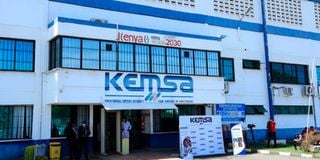Kemsa: We don't have integrity issues

The Kemsa warehouse in Embakasi, Nairobi. Kemsa lost medicines it's believed they were resold on the black market and to private chemists.
The Kenya Medical Supplies Authority’s (Kemsa) new board has distanced itself from its predecessor’s woes, saying its reforms are on track.This follows the publication of the contents of an audit report released by the Global Fund on Tuesday evening.The report said Kemsa could not account for the disappearance of key commodities such as mosquito nets, condoms and tuberculosis drugs from its stores.It covers the period between January 2018 and April 2021, just before the new board took office. President Uhuru Kenyatta disbanded the former board in April following scandals that damaged Kemsa’s reputation.The new board chair, Mary Mwadime, in a statement, said the “media reports alluding and alleging that Kemsa has faced fresh integrity challenges are therefore untrue’.She added: “We wish to confirm that commendable progress has already been made, and the reform agenda is firmly on course. We take pride that jointly with the management teams, we have laid a solid foundation for reforms by creating a shared vision, establishing project teams and training staff to adopt structured problem-solving approaches.”Still, the new board acknowledged that mismanagement at Kemsa had undermined “the realisation of Universal Health Coverage”.“Kemsa was grossly underperforming and largely unable to meet its clients' urgent needs, particularly the delivery of essential Medicines and Products to the Counties, Referral Hospitals and Programs. This state of affairs had endangered the lives of Kenyans and gravely threatened the realisation of Universal Health Coverage (UHC), which is critically predicated on a successful and optimally operating Kemsa,” Ms Mwadime said.The board said it will implement some of the recommendations highlighted in the Global Fund report.“The audit showed that significant improvement is needed in internal controls and assurance over the procurement and supply chain. It also found that improvement is needed in financial management and controls for better accountability, and better absorption and utilisation of investments,” she said.The board has identified challenges such as financial and supply chain crises, warehouse and distribution chaos and procurement hitches.The board said it has come up with strategies to deal with the challenges.“The strategy is anchored on a reform foundation and plans to facilitate global best practices. These best practices include a good span of control, transparent reporting relationships and command structures, compounding related functions for strengthened accountability and a re-determination of optimal staffing levels and norms,” Ms Mwadime said.



